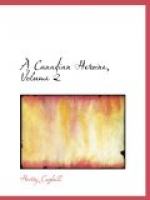The cabin had grown very quiet, and the dull monotonous noise of the paddles had lulled Lucia almost to sleep, when she was startled by the touch of her mother’s hand upon her arm.
“It is very nearly time we were there,” Mrs. Costello said. “If it is a fine night we ought to be able to see the island.”
They drew their cloaks closely round them and went up on deck. The night was brilliantly clear and starlight, though there was no moon, and already the lights of the small American town of Claremont, where they were to land, were in sight, with their bright reflection shining in the river below them. To the left a large dark mass seemed to lie upon the water, and to that Mrs. Costello’s eyes turned.
“There is the island,” she said in a low voice. “Your birthplace, Lucia, and my first Canadian home.”
But in vain Lucia strained her eyes to distinguish the size or form of the land. The end of the island which they were approaching was still thickly wooded, and the drooping branches added still more vagueness to the outline. Only as they came nearer a small clearing was dimly distinguishable, where a kind of promontory ran out into the river, and on the point of land a small white house.
Mrs. Costello laid her hand upon Lucia’s.
“Look!” she said, “can you see that space where the house stands? What a lonely place it looks! I wonder how I lived there for six years. I can see even the place where the canoe used to lie on the beach. There is one there now!” She stood straining her eyes to watch the scene once so familiar, until the steamer, drawing towards the landing-place, completely hid it from her. Then the lights on shore flashed out more brightly close at hand, and the figures of men waiting on the wharf could be distinguished. Just as the cable was thrown on shore a boat came flying across the river from the island. It drew up to the wharf, and next moment Mr. Strafford was seen coming through the little crowd to receive his visitors. They landed immediately, and he led them to his boat.




